Instantly captivating and perpetually playful, this whimsical romp across a world of paper lanterns is utterly enchanting.
The Night Train to Lantern City. Just saying these words out loud immediately conjures an image of a place with warm, hushed lighting spooling out of glazed windows, with billows of steam and smoke misting over the landscape. It’s certainly an evocative kind of opening, but 30 Birds goes one better, placing its detective heroine Zig on a train careering through space on tracks made of clouds, heading toward a city made of actual paper lanterns. It’s a dreamy and impossible kind of architecture, its inhabitants shifting up and down each lantern’s colourful panels and wrapping their 2D bodies around the edges of a very real, 3D space, with doorways transporting them to other miniature lamp spaces hanging around its periphery. The locals themselves are a little impossible, too, as you’ll clock sentient aubergines and disco-loving djinn glyphs, and, of course, a heck of a lot of birds as you saunter through the city’s various districts.
Persian mythology sits at the heart of 30 Birds, and the reason Zig’s been called here in the first place is to witness the awakening of Simurgh, an enormous phoenix-like creature whose god-like status in both real-world legend and in the game forms the backbone of this fantastical tale. Here, Simurgh is the creator of Lantern City, and has been asleep for the past fifty years, dreaming of what to do next with her magical creation. But when the awakening ceremony goes awry and Simurgh gets captured by a mysterious being known only as ‘The Scientist’, Zig sets off on a quest to free her by bringing together the titular avian individuals who can help save her (as Simurgh itself can also be translated as ‘thirty birds’).
But 30 Birds isn’t just some linear A to B hero’s quest adventure. After that initial inciting event sees Zig paired with her first feathered collaborator – a sassy hoopoe called Hoop – you’re more or less free to wander the city however you wish, peeling back its layers and generally noodling through at your own pace. Locals will occasionally give you clues and hints about where you can find certain birds, but after that you’ll need to follow your nose and sense of curiosity – which isn’t exactly hard when Lantern City is so immediately enticing to look at.
The Central lantern is a hive of activity, with people spilling out of shops and baths onto the streets, while the Park feels wild, untamed and teeming with life, a complete contrast from the towering buildings of the College district, but even these warren-like avenues hold some surprising secrets inside them. Then there’s the Grand Bazaar, which is a throng of competing speech bubbles as everyone goes about their business. They all have such distinct characters and a strong sense of place, and they’re wonderful spaces to poke around in.

That said, navigation can feel a little stodgy at times, as remembering which landmarks live on which panels (and how to get back to them) could be smoother if the map in Zig’s phone wasn’t quite so abstract. Each panel is surprisingly spacious, always stretching up and down further than you’re expecting, which can make it hard to get a grasp on where you are at times. A simple zoom out feature could have done wonders to help orient you within these dense and vivid spaces, but you’ll have to make do with just being thorough and meticulous in your exploration. Still, when feathers, paintings and other collectibles gleaming in seemingly locked off windows and obstructed doorways are always drawing your eye toward some hidden nook and cranny, tempting you back behind its layered, picture book diorama, a little bit of backtracking rarely feels like much of a chore.
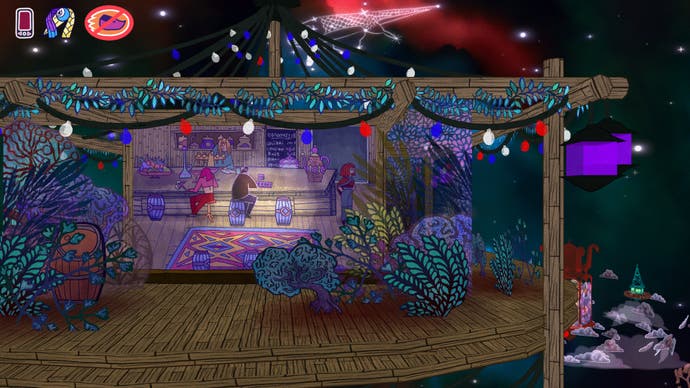
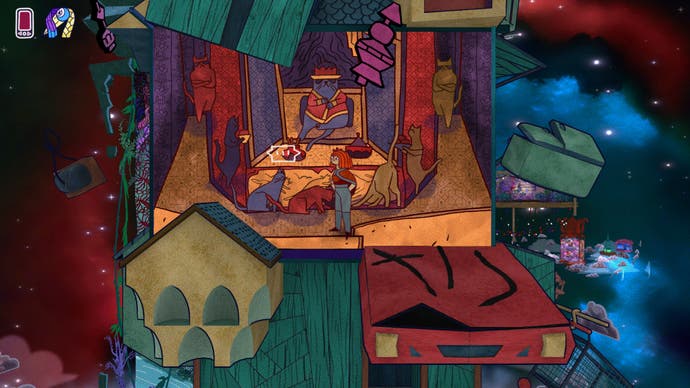
Befriending its 30 birds is also a delight. All of them are surprisingly funny and well-written, for starters – shout out to cult leader Gurubird and the Frasier-esque radio host Lovebird in particular here – and seeking them out forms the main thrust of the game’s story. Some can be spotted in plain sight across each city district, while others require more thorough investigation and some very light puzzling before they’ll reveal themselves. Finding one is often its own reward, as many will instantly give you their contact details as soon as you’ve had a chat with them.
The best ones, though, are the birds that have a little minigame mixed in – though even calling them minigames doesn’t quite do them justice. These aren’t minigames that you can fail, or are forced to try again if you don’t get them right. They’re more like daft, miniature episodes of pure playfulness – whether that’s navigating a Rubix Cube-like prison, diving inside a crocodile’s mouth to find a matchbox inside a vase inside a briefcase inside its stomach, inflicting terrible tattoos on unsuspecting underground market customers, or giving romance advice to Lovebird’s radio listeners.
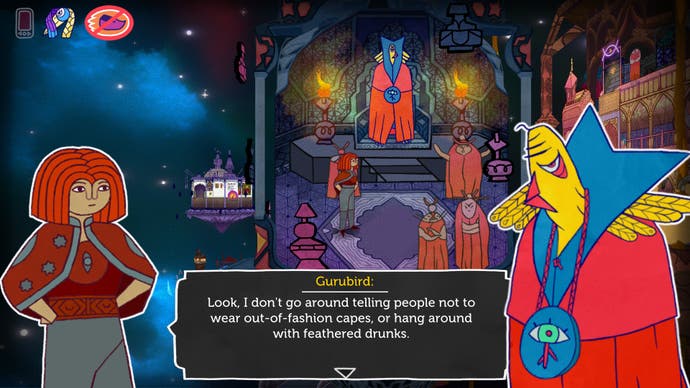
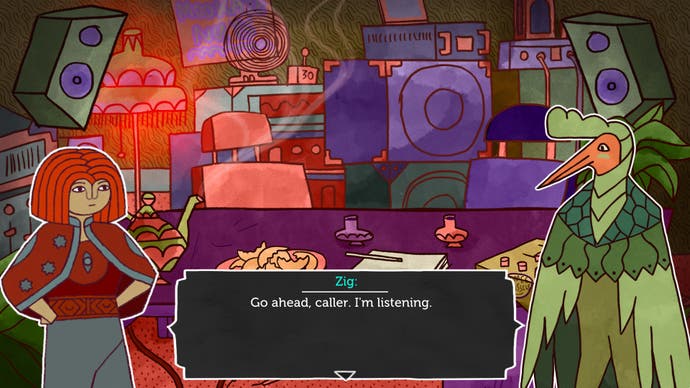
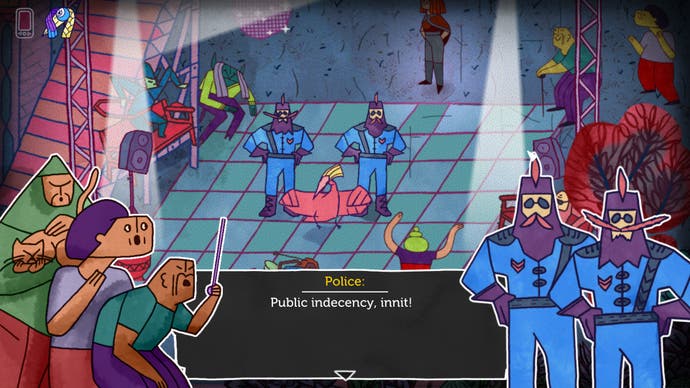
If anything, failure and simply having a go is often encouraged in 30 Birds, and nowhere is this more evident than in its tactile musical puzzles. These are all about twiddling dials, sliding buttons and tuning all manner of doodads to get a particular sound or match shapes to create certain patterns, but there’s nothing pressuring you to hurry things along. Instead, you can just luxuriate in the act of play, which permeates 30 Birds from top to bottom.
Indeed, it’s the kind of adventure that you wish could last forever, or at least a little longer than its tight five or so hour run-time allows for. There’s just enough here to give it a sense of life beyond what you’re able to see and explore as part of the main story, such as distant special lanterns that can only be travelled to via magic carpet, living constellations that impart stories when their fallen stars are returned to them, and an entire Snap-like card game played in its cafes and coffee houses where picture tiles are smashed violently together for gleeful victories. But even if 30 Birds feels like a dream you’ve woken up from earlier than you’d like, what a thing to say you’ve experienced all the same. It’s a game I’ll be thinking about for many months to come, and I only hope we get to see more stops along the Night Train to Lantern City in the future.
A copy of 30 Birds was provided for review by publisher Arte France.










Add comment